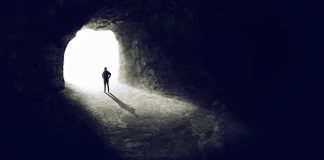Are you really okay?
Let me ask you a question: if a friend of yours or I were to stand in front of you today and ask, “Are you OK?” how would you respond? Could you, or would you, share how you really are? As a society, we seem to be becoming more and more aware of the mental health crisis we are in. On 8 September, Australia...
Hope from the pit
Fire falling from the sky. A massive tsunami. An abandoned city. Let’s be real—it’s probably Los Angeles or New York (although sometimes Sydney or Hong Kong makes a cameo). These are the images we most often associate with the end of the world. Whatever comes to mind for you, no doubt it has been shaped in large part by literature, art and, of...
The pursuit of signs and miracles
Back when I was a student, I heard this joke that, despite being funny, made me stop and think. It went something like this: a man starts hearing an "inner voice" telling him to sell his house, move to Bucharest, and use all the money to bet on a black 13 at roulette. The man complies without question because the voice spoke with...
How false religious conspiracy theories came to abound
The documentary The Resurrection Tomb is based on James Tabor and Simcha Jacobovici’s book The Jesus Discovery[1] and resumes a controversial topic, also published in 2007, when a similar film was released.
Collaboration within the church: from territory to shared mission
Why do some Christian churches remain trapped in an “economic market” paradigm, where success is measured in comparison with others? And how can they...
The fascinating Gospel of John
Dr Kendra Haloviak-Valentine, Professor of New Testament Studies at La Sierra University in Redlands, California, comes from a family with a tradition of theology and research.
A street cat named Bob
There are many moments when, in situations that seem to have no solution and everyone has given up believing, especially the one who needs the solution, help comes in a completely unexpected way. For James Bowen, his rescue came in the form of an injured ginger cat.
Humble faith
The Church of the Nativity in Bethlehem is the oldest continuously-used church building in the world. It dates from the fourth century, when Roman Emperor Constantine’s mother visited the Holy Lands to identify locations from the life of Jesus for pilgrimage destinations and church sites. From a distance, the point of entry to the church is not obvious, particularly when the area is...
Waiting for hell
The idea of hell takes up a dark corner in most of our minds, whether we think about it or not.
The crossless Cross
The mention of the city of Rio de Janeiro evokes images of the traditional carnival or the vast, exotic beaches such as Ipanema and Leblon. But most often we think of the huge monumental statue representing Christ the Redeemer (Cristo Redentor) with wide, open arms, looking down towards humanity from the top of Mount Corcovado (700m).
“All religions are good.” True or false?
Globally there are 19 major religions, divided in turn into 10,000 religious groups. Each group claims to be the holder of the Truth. If one of them really holds the Truth, that means there are about 9,999 false religious groups.
The forgotten book
Almost 500 years have passed since the 1524 publication of the work that one prominent leader of the 16th-century Protestant Reformation, Andreas Karlstadt, wrote in defence of the Sabbath doctrine.[1] It was the first work on this subject written by a leader of the Reformation.
The Great Fire of Rome and the “hidden hand”
The Great Fire of Rome broke out on a hot summer night in July 64 AD.
Overcoming trauma and the role of forgiveness in family life
Studies indicate that most people experience at least one traumatic event in their lifetime, whether physical or psychological.
The rabbi (who never was a rabbi) who will never be forgotten
Given that no one could become a scholar without formal training, it is truly remarkable that Jesus, who was not formally educated, was nevertheless recognized as a “Rabbi” (Mark 12:14 cf. John 3:2).[1]


























